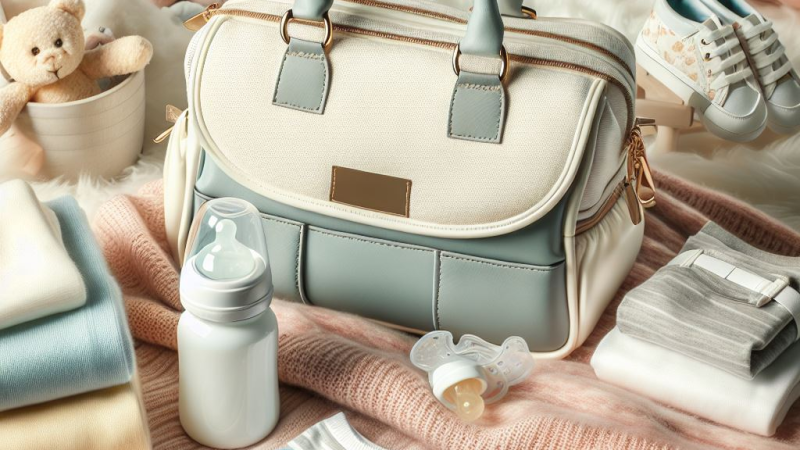
Essential Newborn Baby Layette: Everything You Need to Prepare
The arrival of a baby is an exciting moment, but it can also bring up many questions, especially when it comes to preparing the newborn baby layette. Knowing exactly what to include can make a big difference in being ready and well-prepared. In this guide, we offer a complete list of essential items for your baby's layette, categorized to help you stay organized, along with practical tips to make the process easier.
What is a Baby Layette?
A baby layette is a collection of essential items you need for newborn care. It typically includes clothing, hygiene products, feeding accessories, and a few items for the mother. Having a well-prepared layette will help you handle the first few days with ease, both at the hospital and at home.
Complete List of Must-Have Items for a Newborn Baby Layette
Below is a detailed list of the necessary items for a newborn baby layette, categorized to make your organization easier:
1. Newborn Baby Clothing
Clothing is one of the most important aspects of the baby layette. Newborns need comfortable, practical clothing that is gentle on their sensitive skin.
- Cotton bodysuits: 5-7 pieces (short-sleeve or long-sleeve, depending on the season).
- Full-body pajamas: 5 pieces with front or leg openings to make diaper changes easier.
- Outfits: 3-5 comfortable outfits for daytime use.
- Socks and mittens: 3 pairs of each to keep your baby warm and prevent scratching.
- Hats: 2 cotton hats to protect your baby's head and keep it warm.
- Swaddles or blankets: 2-3 pieces to wrap your baby and keep them comfortable.
- Jacket or coat: Include outerwear if your baby will be born in a cold season.
2. Diapers and Changing Supplies
Diaper changes will be a constant part of your routine, so make sure you're well-stocked with the essentials:
- Disposable or cloth diapers: 1 pack of newborn-size diapers.
- Wet wipes: Hypoallergenic and fragrance-free wipes for your baby's sensitive skin.
- Diaper rash cream: An essential product for preventing or treating diaper rash.
- Portable changing mat: Ideal for both home and on-the-go diaper changes.
- Diaper bag: To carry everything needed when you go out.
3. Baby Feeding Supplies
Whether you plan to breastfeed or bottle-feed, you will need some of these items:
- Bottles: 2-4 newborn bottles with appropriate nipples.
- Formula milk: If you're not breastfeeding, consult your pediatrician to choose the best formula.
- Nursing pillow: Helps you get comfortable during breastfeeding.
- Burp cloths or bibs: 5-7 pieces to clean up after feeding.
- Bottle sterilizer: Optional, but helpful for keeping bottles clean.
4. Baby Hygiene and Care
Newborns have delicate skin that requires special care products:
- Baby wash and shampoo: Gentle, fragrance-free formulas.
- Natural sponge or soft washcloth: To clean your baby's body during bath time.
- Hooded towels: 2-3 soft towels for drying your baby after bath time.
- Soft-bristled brush: For gentle brushing of your baby’s hair.
- Bath thermometer: To ensure the water is at the correct temperature.
- Nail clippers or rounded-tip scissors: To safely trim your baby's nails.
- Saline solution and sterile gauze: To clean your baby's eyes and umbilical cord.
- Digital thermometer: To monitor your baby’s temperature if necessary.
5. Sleeping Essentials
Sleep is important for newborns, so ensure you have the necessary items to create a safe and comfortable sleeping environment:
- Crib or bassinet: With a firm and properly fitting mattress.
- Fitted crib sheets: 2-3 sets for the crib or bassinet.
- Waterproof mattress protector: To protect the mattress from accidents.
- Sleeping bag: A safer alternative to blankets to reduce the risk of suffocation.
6. Baby Transport Accessories
If you plan to travel with your baby, you'll need some essential items for safe transportation:
- Newborn car seat: A properly certified seat that meets safety standards.
- Stroller or pram: Make sure it’s comfortable and practical for your needs.
- Baby carrier or sling: A convenient option to keep your baby close while keeping your hands free.
7. Other Useful Accessories
In addition to the basics, here are some items that can make your daily routine easier:
- Pacifiers: If you choose to use them, keep 2-3 sterilized pacifiers on hand.
- Baby monitor: To keep an eye on your baby while they sleep.
- Humidifier: Helps maintain the right level of moisture in your baby’s room to prevent skin irritation.
- First aid kit: Includes a nasal aspirator, thermometer, and other basic products.
Tips for Preparing the Baby Layette
- Plan ahead: Start preparing the layette at least one month before your due date.
- Check with the hospital: Many hospitals provide specific lists of what you need to bring for the layette.
- Include items for yourself: Don’t forget to pack comfortable clothing, personal hygiene items, and necessary documents for the hospital.
- Avoid overpacking: While it’s tempting to buy everything, focus on the essential items you’ll actually use.
Frequently Asked Questions (FAQ)
1. When should I prepare the baby layette?
It’s recommended to have it ready by the 32nd to 36th week of pregnancy.
2. How many clothing items should I include?
Include enough clothing for 5-7 days, considering frequent changes due to spit-ups or accidents.
3. What size diapers should I buy?
Buy newborn-sized diapers (size 0 or 1), but don’t stock up too much as babies grow quickly.
Conclusion
Preparing the newborn baby layette is an exciting and essential step in welcoming your new baby. Having everything you need, from comfortable clothing to hygiene products and transportation items, will ensure that you are ready to care for your little one with confidence. Plan ahead, review the list, and enjoy this special time with your newborn.
